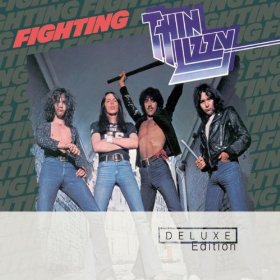
Thin Lizzy
Nightlife and Fighting, Reissues
Hip-O Records
With a melodic, interplaying double guitar attack and Phil Lynott’s poetic lyrics that could evoke both tenderness and toughness as well as lessons in Irish history, Thin Lizzy was unique among ’70s hard rock acts. Balancing power, musicianship, and intelligence, it’s a wonder that Thin Lizzy was never as huge in America as it was in Europe.
Sure, everyone knows “The Boys are Back in Town” and “Jailbreak,” but the band had so many albums full of all that was great about ’70s rock, albums that are full of memorable hooks, monster riffs, and stories about bad boys with hearts of gold. Hip-O has just released another pair of Lizzy’s early ’70s albums, and while they might not be the ones that fans turn to first or the ones to play to newcomers, they are both collections of great songs, just a bit different from the rest of their collection.
Following up the previous year’s Vagabonds of the Western World, 1974’s Night Life is quite a departure from that album’s balance of the tender (the should-be classic “Little Girl in Bloom”) and the tough (“The Rocker,” “Vagabond of the Western World”), instead getting into a more musical, late night album, something to play after the adventures of Vagabonds of the Western World had finished, or when the listener wanted something to play in his bachelor pad as the night started to unwind.
While Vagabonds opened with the bluesy, rocking “Mama Nature Said,” Night Life opens with “She Knows,” a bouncy, understated pop nugget with a laid-back feel. The title track cops Willie Nelson’s tune of the same name before going into a melancholy, regret-filled ditty that nevertheless remains with a touch of optimism, possibly due to the understated strings on the track. There are some rockers on the album, like “It’s Only Money” with its upbeat, funky guitars, or “Sha La La,” but for the most part, the album has an overall feel of longing and regret. Songs like “Showdown” and “Still in Love with You” sound more “grown up” than the Lizzy of the previous year. “Philomena” borrows from traditional Irish music and sounds like a holdover from the more rocking Vagabonds, while “Frankie Carroll” is another Phil Lynott doomed character study that he would continue to perfect.
It was said the band didn’t like the production on Night Life, and it’s easy to see why. While it sounds great, especially today, it must have been seen as an anomaly in their catalog full of heartbreaking bad boys and rockers. Listening to it today, it still seems like an oddity in their catalog, but the album’s well-produced smoky, subdued, late night feel makes for a nice palate cleanser between the heavier rock Lizzy would become known for. The production is sharp and clean on the new remaster, and the extra disc contains BBC versions and rough mixes of some of the albums’ songs. Nothing here is as radically reworked as some of the extras on Black Rose: A Rock Legend, and it’s obvious that the band came to the studio with a bundle of more mature, less-rocking songs.
That wasn’t the case with 1975’s Fighting. As if the band was embarrassed from the previous year’s album and wanted to showcase its rocking again, Fighting kicks open the door with a rocking cover of Bob Seger’s “Rosalie,” utterly transforming it into their own song. The next two songs, “For Those Who Love to Live” and “Suicide” showcase the interplay between Brian Robertson and Scott Gorham, their guitar lines snaking in and out of each other, resulting in a soaring, anthemic feel. “Fighting My Way Back” is Lizzy at its most rocking, yet simplest in terms of song structure. There are ballads on Fighting, like the Night Life-sounding “Spirit Slips Away,” but the album overall is more upbeat and more rocking. “Freedom Song” is interesting in that it points the way to many of the songs Lynott would produce in the next few years. A character study of a freedom-seeking man, shades of “Jailbreak” and “Cowboy Song” are here, waiting for the next album. The extras here are more versions of songs on the album, with the exception of a few songs, like “Half Caste,” another in a string of autobiographical songs Lynott would pen about his troubles growing up half-black in Ireland, and the pretty piano-based “Song for Jesse,” which seems too delicate for an album like Fighting
Overall, Fighting is a bit more representative of Lizzy’s overall sound, a sound that would come to fruition on the next year’s Jailbreak and Johnny the Fox and 1977’s Bad Reputation (which seems to be the only album that hasn’t been reissued yet. What’s the hold up?). In the days before the internet, your reviewer always thought Fighting was Thin Lizzy’s first album, mostly because the ideas were there, but many of them didn’t seem as fully formed as they would in the next four studio albums, a string which every rock-loving individual ought to own and worship. Taken as a pair, Fighting and Night Life are great, if perhaps unrepresentative albums sandwiched in-between a string of excellent poetic, yet hard-rocking albums. Hopefully the reissue campaign will continue, if only to give Americans a better feeling of that “Boys Are Back in Town” band.
Thin Lizzy: http://www.thinlizzy.org












